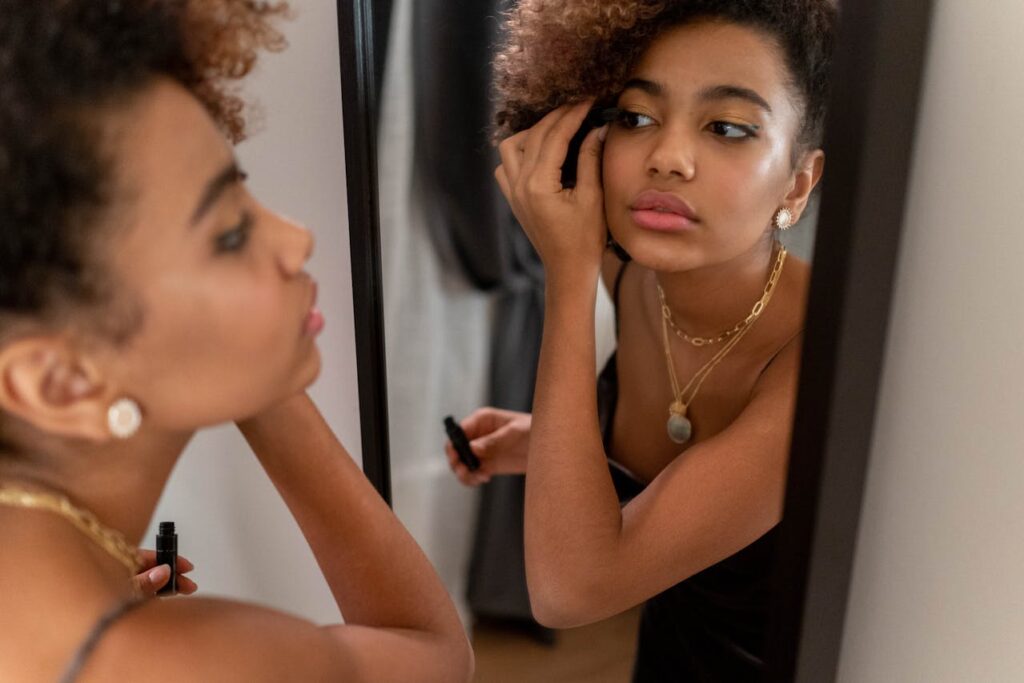The connection people have with mascara can be a bit tangled and often a mix of the two. Mascara is a common component of various makeup routines and can be equally adored for its capacity to increase eyelashes and give an eye-catching look, but it is also criticized for a variety of reasons.
Certain people consider mascara to be an essential element in their beauty routine, increasing their confidence and letting their eyes shine.
However, there are those who have trouble applying mascara because of issues such as the clumping effect, smudging, or difficulty applying. The polarity in attitudes toward mascara is the basis for a deeper investigation of the subject.
One of the most intriguing features that can be observed with mascara is that some people are not as attractive or even uncomfortable wearing it.
Photo by: Cottonbro studio
Things like personal preference, the standards of society regarding beauty, and personal perceptions of beauty play a part in the way we experience this. Understanding the reasons why some people believe this way could offer additional useful insights into the psychology behind the self and beauty.
The main goal of this article is to dive into the scientific facets that are the basis for our perceptions of beauty, attractiveness, and aesthetics with mascara.
By examining the scientific basis of the way mascara interacts with eyelashes, skin, lashes, and other facial features, We hope to discover the reasons why some people feel ugly wearing mascara.
With a scientific approach, we attempt to unravel the psychological and physiological mechanisms that influence how mascara is perceived and how it affects self-image.
How Does Mascara Work?
Mascara enhances the length of both upper and lower eyelashes. You can use it to define a darkened lash appearance or increase the thickness of your eyelashes. The main purpose behind mascara is to make your eyelashes appear longer, more dense, and more distinct, thus highlighting the eyes and improving the overall appearance of your face.
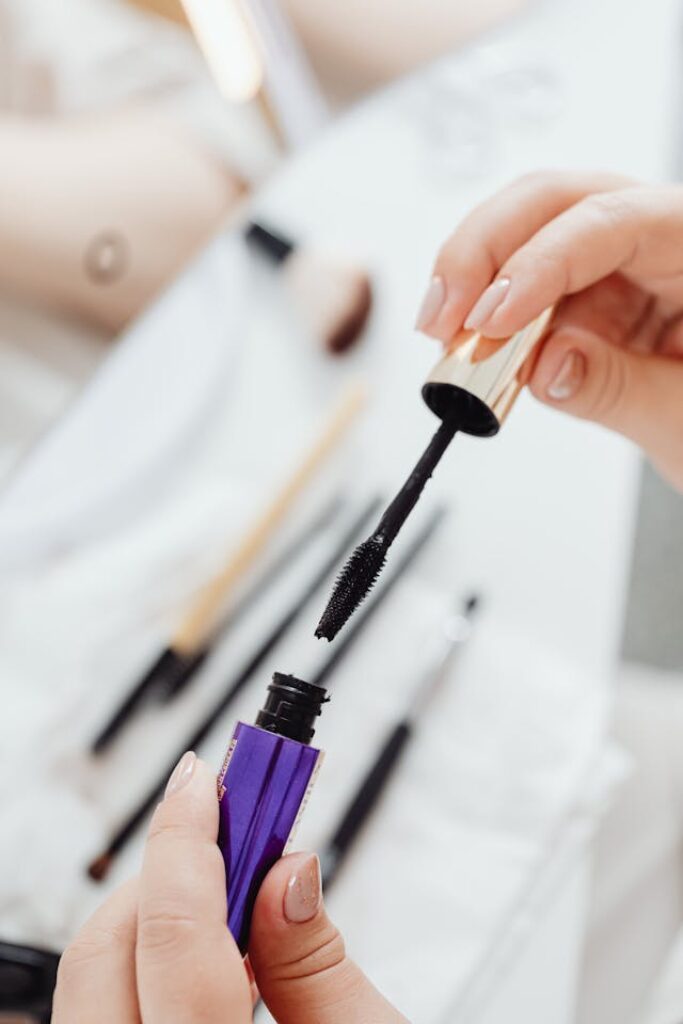
Photo by: Karolina Kaboompics
Ingredients
Mascara typically has the following ingredients: oils, pigments, waxes, polymers, silicones, preservatives, and other ingredients. The most commonly used type of mascara is a liquid texture contained in a tube that is applied with a brush.
The Evolution of Mascara: From Ancient Egypt to Modern Formulations
Kohl, the substance that is used to darken the appearance of eyelashes, eyebrows, and eyelids, was first used about 4000 BC in the ancient times of Egypt. Kohl is used as a way to conceal eyelashes, and it is believed to keep away evil spirits and safeguard the soul.
Males and females alike used it. Antimony powder was first discovered in the late 19th century. In the mid-19th century, the French discovered antimony during their conquest of the ancient city of Mascara, located in Algeria. The powder was used to beautify the skin and also to guard against eye diseases by nomadic.
Modern Mascara: When was mascara first invented?
The invention of today’s mascara dates back to the 19th century. Eugene Rimmel developed a cosmetic using petroleum jelly, which led to Rimmel being a synonym for mascara in many languages.
Helena Rubinstein’s Innovation: In 1957, Miss Helena Rubinstein, founder of the eponymous company, introduced an invention that dramatically improved mascara, making it easy to use and less messy.
Popular Types of Modern Mascara
Volumizing Mascara: This type of mascara gives thickness and volume to the eyelashes, which makes them appear longer and more striking.
Lengthening Mascara: Lengthening mascara is made of polymers that lengthen the natural lashes, giving them a longer and fuller look.
Waterproof Mascara: Waterproof mascara contains wax oil minerals, mineral oils, and waxes that deflect fluids, which makes it resistant to the effects of water. It is appropriate for use in situations involving sweat, humidity, tears, or rain.
Non-clumping Mascara: This mascara type contains silk extracts and glycerin to prevent clumping and give an appearance that is more natural.
Lash Defining Mascara: Lash-defining mascara gives volume, thickness, and length. It spreads evenly over every eyelash.
Curling Mascara: Curling mascara is made up of filming polymers that expand after application, providing a natural curl that lasts throughout the day.
The Science Behind Beauty Perception
Contrary to the popular belief that wearing mascara, enhances the appearance of a person, there are occasions when people experience the reverse impact. This puzzling fact has people wondering about the real causes of feeling unattractive when you put mascara on.
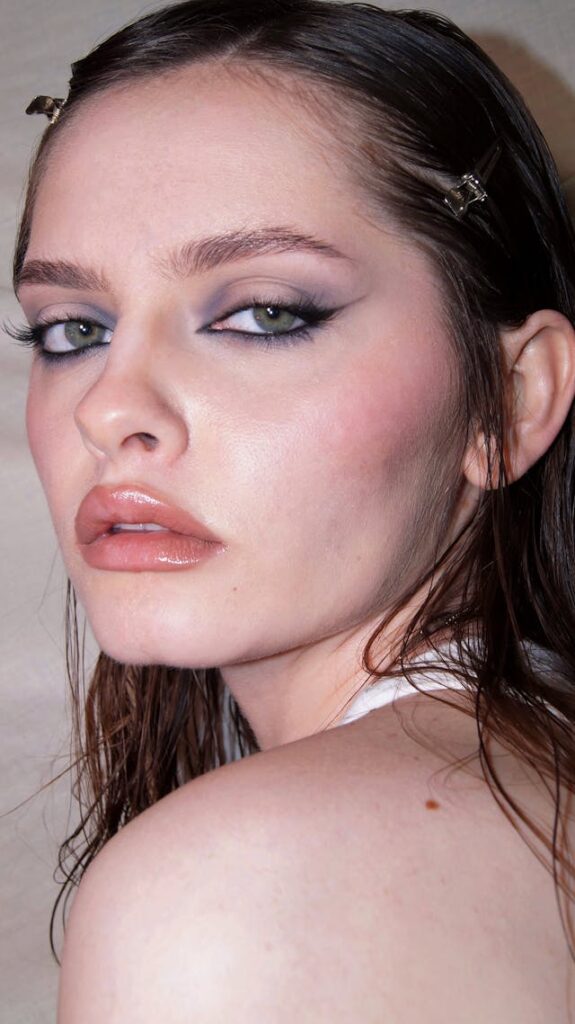
Photo by: Karolina Biloshenko
The Role of Symmetry: How Mascara Can Alter Symmetry Perception
- Symmetry Perception: The outcome of research has revealed that the use of mascara, affects perceptions of symmetry in facial appearance. Research has explored how the use of mascara may change the perceived symmetry of the face and eyes and can affect overall beauty.
- Eye Size Illusion: Research has explored the ways in which eyeliner, mascara, and eye shadows can create illusions of eye size, altering the balance and symmetry of the facial features. The makeup application, especially mascara, is a factor in changing the perception of size and symmetry.
- Enhancing Facial Features: Mascara adds extra volume and definition to the eyelashes and may contribute to improving the eyes’ balance and symmetry. Both are essential to a person’s appearance. The way you apply mascara could alter how symmetry in the face is perceived by other people.
Psychological Factors: Individual Preferences and Societal Standards
- Individual Preferences: Cosmetics, such as mascara, are a personal preference. Research has revealed the ways that personal grooming habits, including the use of cosmetics, can affect self-image and social perceptions. The choice to wear makeup, which includes mascara, is often influenced by personal tastes as well as the desire to improve the appearance of one’s self.
- Societal Standards: The beauty industry as well as societal norms play a major impact on how people perceive aesthetics and beauty. Studies have shown that social expectations of beauty affect the choice of mascara, as well as the way people see themselves and others. Social norms can influence the choices people make about the use of makeup and grooming techniques.
The Impact of Personal Image: Confidence and Self-Perception
- Confidence Boost: Mascara is an excellent way to boost your image and self-confidence. Research has shown that using mascara, can boost self-esteem. The application of mascara, is frequently associated with greater confidence and feelings of self-confidence.
- Self-Perception: Research has proven that using mascara, can affect how people perceive themselves. Cosmetics may create a more positive self-image and affect the way individuals perceive their attractiveness and general appearance. Mascara, in particular, is a key element in shaping self-perception and confidence.
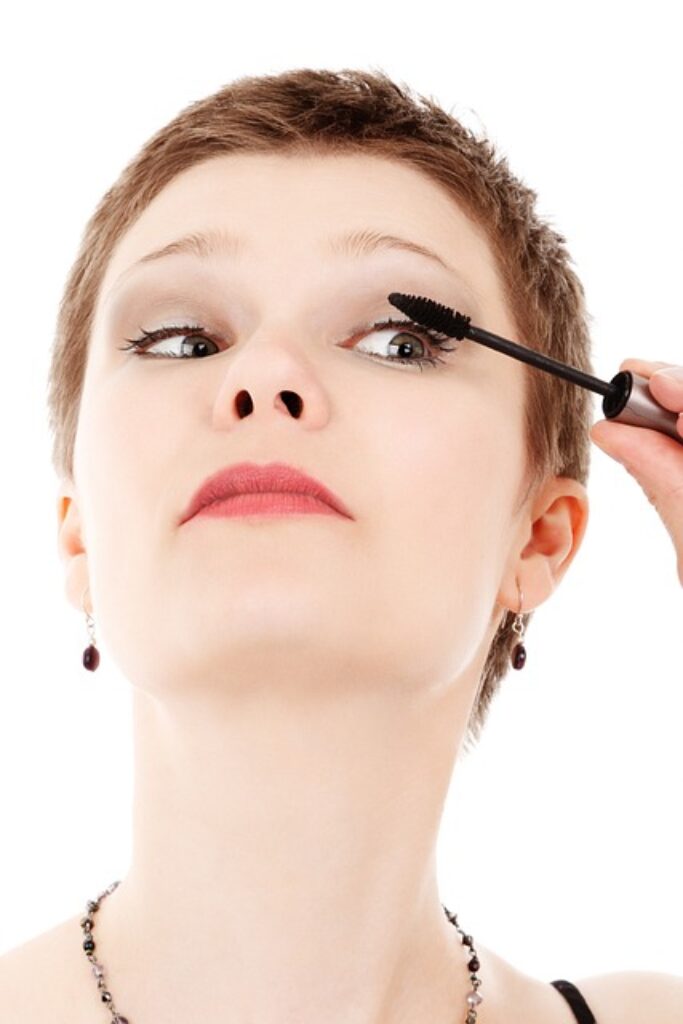
Image by: PublicDomainPictures from Pixabay
Common Problems with Mascara Application
Clumping and smudging are the bane of many mascara lovers.
Clumping
To prevent clumping, clean off any excess product before applying mascara. Use a moisturizing product to distribute the mascara evenly from the root to the tip of your lashes.
Smudging
Make sure you choose a formula with minerals and silicone in order to help it dry quicker and last longer. Apply the beauty-blender liner. Keep the visiting card or play card between the lashes and the skin to prevent smudges, and avoid using the entire brush to apply mascara on the lower lashes. Only use the tip of the brush to apply mascara to the bottom lashes.
Irritation and Sensitivity: Allergic Reactions and Eye Discomfort
Before applying the mascara, test it by putting a small amount on a lesser-noticeable area of the face and letting it sit on for at least 24 hours. Opt for mascara labeled as hypoallergenic, fragrance-free, paraben-free, dermatologist-tested, and ophthalmologist-tested.
How long does mascara last for sensitive eyes?
If your eyes are sensitive, be sure to avoid mascara when it causes irritation. Replace the mascara after three months to reduce the bacterial growth on the mascara brush, and don’t share your mascara or any other eye makeup.
Finding the Right Formula: Matching Mascara to Individual Needs
Be aware of factors like the shape of your eyes as well as the type of lash and desired effects when choosing the best mascara for your needs. For instance, choose a volumizing mascara for thin eyelashes or a lengthening mascara for short lashes, as well as a waterproof mascara to treat eyelids that are oily or have watery eyes.
Why do some women find it hard to look attractive with mascara?
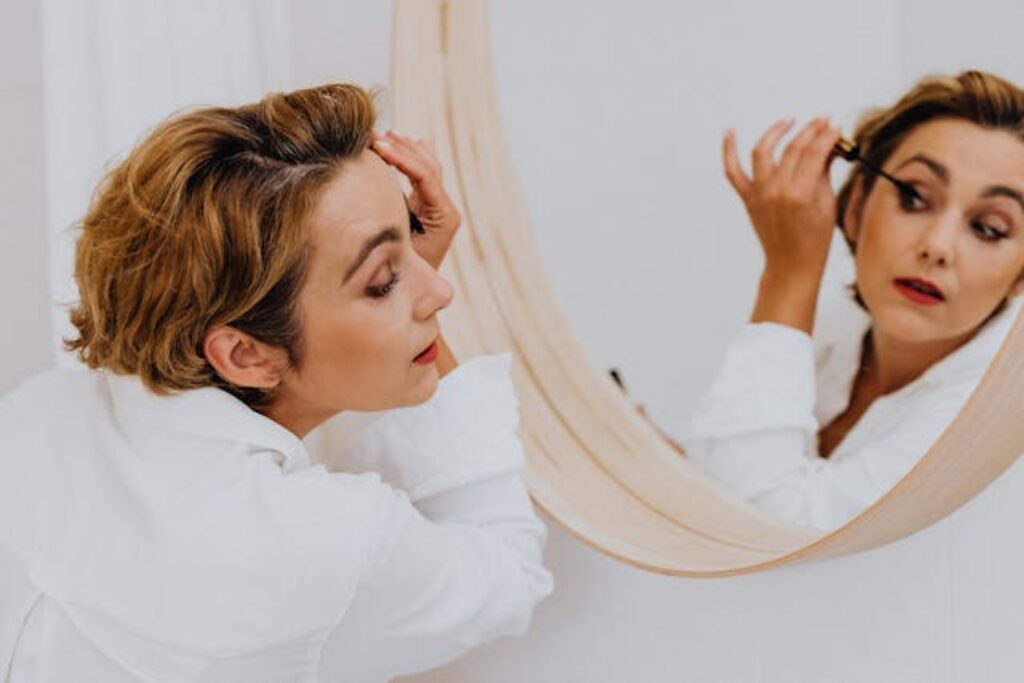
Photo by: Karolina Kaboompics
Certain people may be uncomfortable wearing mascara due to the fact that they are more comfortable with their natural appearance. The change in appearance could be a bit unsettling. Introducing mascara gradually into a routine of daily life can help people adjust to the new look, allowing them to get more comfortable with the new style as time passes.
Misapplication or Overapplication
Depositing excess mascara on lashes can lead to a heavy, clumpy look that can be unnatural and unsightly. This could be due to excessive amounts of product. Additionally, you are not removing any excess product from your brush. You are applying many layers without waiting for each layer to dry.
Proper Application Tip: To apply mascara correctly, curl the lashes with an eyelash curler. Apply the mascara and making sure that each layer is become dry, before applying the next.
Balancing Makeup
If you are applying mascara, it is important to keep the appearance in balance with other makeup in order to avoid creating an excessively dramatic or unnatural look. This will make people feel more at ease and attractive when they put on mascara.
Self-Esteem
The use of mascara, can have a significant impact on self-esteem. Studies suggest that makeup may give an instant boost to confidence in oneself, but overuse or dependency on makeup could cause negative self-image and self-esteem problems.
People may feel the need to apply makeup to look attractive or presentable, and this can impact their self-esteem.
Body Image
The impact of the beauty industry on women’s body image as well as their self-image is profound. Research has shown that the beauty industry has the potential to affect a woman’s confidence in herself and body image, in addition to her perception of beauty.
Mascara plays an important part in improving facial features and changing perceptions of beauty. However, having to comply with social aesthetic standards can cause feelings of being unattractive and lacking makeup.
Social Influences
Social perceptions and influences have a major impact on the way people feel about their appearance, whether they wear it or not. The media, cultural standards, and expectations of society influence the way people perceive their appearance and beauty.
Mascara is commonly used to meet social standards of beauty and boost one’s appearance to satisfy these standards. The pressure to appear in a certain manner can lead to feeling unattractive without makeup, as people might feel judged or unworthy of following these guidelines.
Tips and Tricks for Mascara Application
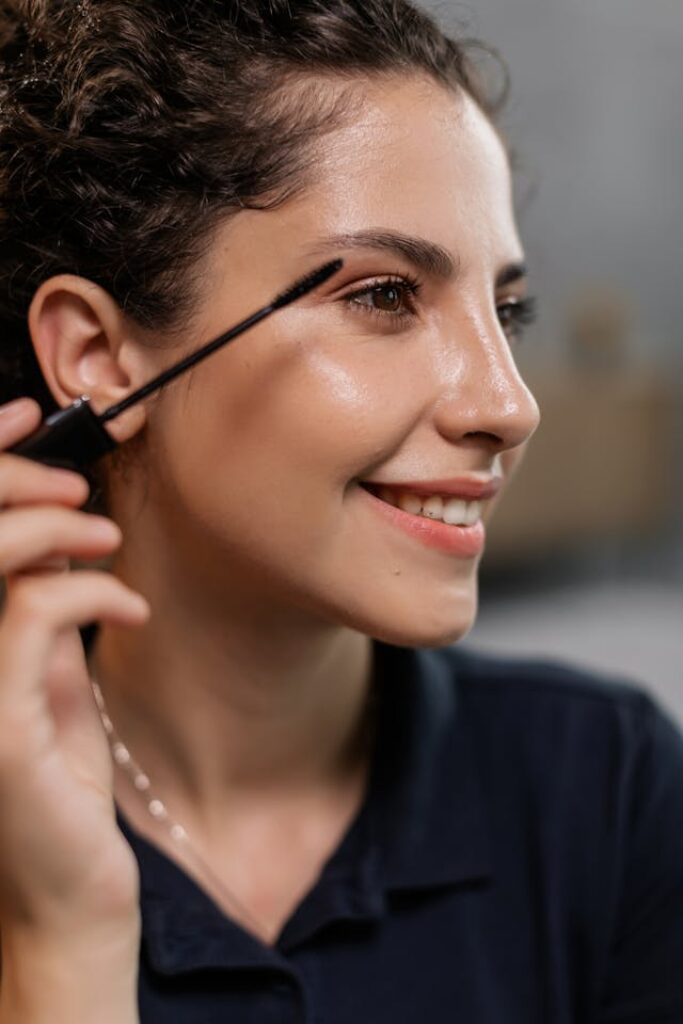
Photo by: Alena Darmel
Preparing Your Lashes: Curling, Priming, and Conditioning.
Curling
Curling the lashes before applying mascara will lengthen, lift, and make them appear larger. It also allows mascara to stick better to the lashes, which results in more defined eyes.
Priming
Applying primer to the eyelashes before applying mascara can create a smoother base for mascara to stick to the lashes, which reduces the likelihood of clumping and extends the mascara’s life.
Conditioning
Castor oil-based lash conditioner can strengthen and improve the health of your lashes, promoting growth and preventing breakage.
Wiggling
Applying mascara in a circular motion from root to tip helps create a distinct and even coat on each lash to prevent clumping and ensure a smooth application.
Comb through the lashes
Using a clean mascara wand or combing between coats can help to remove any clumps and separate the mascara lashes, resulting in more natural-looking lashes.
Angle
Holding the wand at a diagonal downward angle and gently moving it across the eye could help get rid of clumps and lash lumps.
Layering
Applying multiple coats (3 to 4) of mascara and allowing each layer to dry before applying the next coat will increase length and volume without clumping.
Choosing the Right Mascara for your needs
Understanding the concept of formulas and brushes for your eyes.
Formula
Selecting a mascara that works for your particular lash, like lengthening, volumizing, or curling, can help to complete the desired appearance.
Brush
The choice of mascara brush is also very important and a key factor in enhancing your lash appearance. Choosing a mascara brush that matches your eye’s shape and type of lash, such as a curved, tapered, conic, hourglass-shaped, or traditional mascara brush, will ensure easier application.
Always wipe excess product
The step of wiping excess mascara off the brush before applying the product will help to avoid the clumping process and warrant an even and consistent application.
Mascara age
Replace mascara every three months. This will help to avoid clumping, ensure that it is free from any bacterial growth, and it will make it safe for sensitive eyes.
Redefining Beauty Standards: Embracing Diversity and Individuality
- Unleashing from Social Expectations: Being natural is about breaking away from the norms of society. This can be done by changing beauty in such a way that it embraces the diversity of individuals and their individuality.
- Celebrating Uniqueness: Recognizing the unique features of one’s own, like freckles, the hair’s curly style, and even gaps between teeth, can improve self-esteem and inspire confidence and self-esteem.
- Positive Self-Talk: Self-talk and positive affirmations are a great way to strengthen the idea that everyone is beautiful in their own way.
Enhancing, Not Masking: Using Mascara as a Tool for Self-Expression
- Minimalistic Approach: Applying mascara to highlight natural appearances rather than covering them up is an excellent way to achieve a smooth and natural look.
- Subtle Glow: Affording high-end cosmetics, such as a premium mascara, can offer a natural appearance without looking ugly.
Confidence is the Key: Accepting Your Unique Characteristics with or without Mascara
- Self-Love: Being a natural beauty advocate means learning to appreciate yourself, taking care of your body and skin, and highlighting your natural beauty for others to admire.
- Positive Energy: When one is able to accept themselves and face life with confidence and pride, they release positive energy that attracts others.
- Self-Care: The practice of self-care, like pampering and taking care of your body and skin, can help you create a positive image of yourself and increase your self-confidence.
- Going Makeup-Free: The confidence muscle can be developed over time. A time-based commitment to a makeup-free lifestyle will help people feel at ease with their naked appearance and their natural beauty.
- Social Media Detox: Cleaning up the people who are followed on social media and removing people who don’t help those on their path to self-love may help create a more positive self-image.
- Positive Affirmations: Making positive affirmations like “I have confidence in my natural beauty” can help promote the idea that everyone is gorgeous in their own unique way.
Conclusion
In conclusion, how do I look ugly with mascara? Our exploration and research of the various aspects of mascara have given us an improved understanding of the effects it has on self-image as well as beauty.
From its earliest days in Egypt to the most recent formulations, mascara has grown into a highly effective tool that can increase the look of eyelashes and highlight your facial features. However, it does have its own problems, since people face issues like discoloration, clumping, and getting smudged.
Research and Study
Through research and study, we’ve discovered the ways in which mascara influences our perception of symmetry and beauty dimensions. Personal factors such as society’s standards and preferences can influence our perception of mascara, impacting our confidence in ourselves and our self-perception.
Additionally, the common issues with applying mascara stress how important it is to use the correct method and the correct formula that meets the individual’s preferences.
The process doesn’t just end with the application of mascara. It continues to be a discussion of adopting a natural approach to beauty and changing social standards. By celebrating individuality and diversity, we can let go of false expectations and foster our love for ourselves by being open.
Whether we wear mascara or not, the most important thing is to be confident in our own individuality and radiate positive energy.
Confidence in the essence of who we are
The problem of looking ugly after wearing mascara is the truth behind beauty. Beauty is a subjective feeling that is available in a variety of ways.
It’s not only about the makeup we decide to apply and the rules we adhere to. It’s about embracing our real selves and acknowledging the beauty inherent in us.
As we continue our journey, we must be aware that the real beauty lies in us. Whether we wear makeup or not doesn’t matter.
References and content creation resources
- https://www.dailymail.co.uk/femail/article-4898984/Is-mascara-making-UGLY.html
- https://www.loreal.com/en/news/group/helena-rubinstein-a-champion-of-the-beauty-industry/
- psychologytoday
- www.thefactsabout.co.uk
- https://cosmeticobs.com/en/articles/products-38/le-mascaranbsp-lhistoire-2611
- https://www.frontiersin.org/journals/psychology/articles/10.3389/fpsyg.2021.661006/full
- https://www.ncbi.nlm.nih.gov/pmc/articles/PMC8956164/
Frequently Asked Questions (FAQs)
Mascara may cause clumping, smudging, or smearing under your eyes, which can make your lashes look ugly and unnatural. This could make you feel like you’re not looking good when you wear mascara.
To prevent the appearance of ugly eyes, make sure you apply mascara in small coats and let the lashes dry between coats. Do not pump the wand inside and out of the tube because this could introduce air, making the mascara dry out more quickly and resulting in a clumpy application.
Those with sensitive eyes may be allergic to mascara or one of its ingredients. If you experience symptoms like itching, redness, and swelling after the application of mascara, you could be suffering from an allergy. Consider using a hypoallergenic mascara for sensitive eyes, or one free of common allergens like fragrances or parabens.
Yes, mascara may make your eyes appear smaller when applied too much, or cause your lashes to clump together. To prevent this from happening, use an easy hand when applying mascara. Focus on the outer lashes in order to give a more curled and lifted look.
There’s no need to stay away from mascara completely. Instead, you can experiment with various mascara types and methods of application to discover the one that works best for you. You might consider using a lengthening mascara in place of a volumizing one, or try applying the mascara to the outer corner of your lashes to create a more subtle style.

